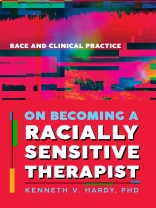Transform your clinical practice by transforming yourself.
Claims of color blindness and the insistence that all clients are essentially the same have contributed to a dearth of knowledge and understanding regarding the delivery of racially sensitive treatment. For many clinicians, addressing issues of race in therapy mirrors the same discomfort that permeates most of our efforts to discuss it outside of treatment. Yet providing racially sensitive therapy, as well as possessing the clinical acumen to address complex issues of race and culture, is vital to competent contemporary practice.
The volume is organized into three fundamental sections with contributions from mental health experts who have done the work to unlearn systemic biases about race and therapy. The first section introduces the concept of a racially sensitive therapist and what it means to become one. The second section focuses on cultural and racial storytelling to help uncover unknown parts of oneself and emphasizes racial self-examination, self-interrogation, and personal transformation. And the final section transports the reader from seeing and being to doing with racially informed intervention methods. A monumental undertaking, this book is an essential step for healers and caregivers to reframe the therapy process for all clients.
Contributors include: Lane Arye, Vanessa Bing, Toby Bobes, Bonnie Cushing, Elana Katz, Niketa Kumar, Sharon RC Lee, Gloria Lopez-Henriquez, Yasmeen Rubidge, and Virginia Seewaldt.
O autorze
Kenneth V. Hardy, Ph D, is President of the Eikenberg Academy for Social Justice and Clinical and Organizational Consultant for the Eikenberg Institute for Relationships in NYC. Dr. Hardy provides workshops, training, and consultations to a host of organizations and institutions throughout the United States and abroad. He is a former Professor of Family Therapy at both Syracuse University, NY, and Drexel University, PA. He is the author of Racial Trauma: Clinical Strategies and Techniques for Healing Invisible Wounds, and The Enduring, Invisible, and Ubiquitous Centrality of Whiteness, both from W. W. Norton. He is also co-author of Culturally Sensitive Supervision; Promoting Culturally Sensitive Supervision; and Revisioning Family Therapy.












